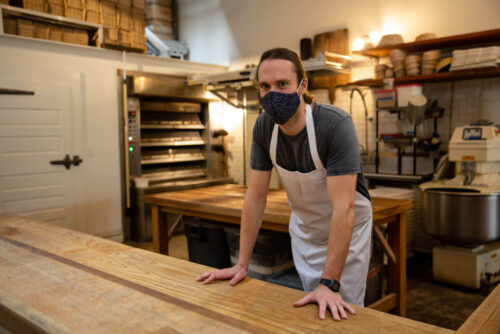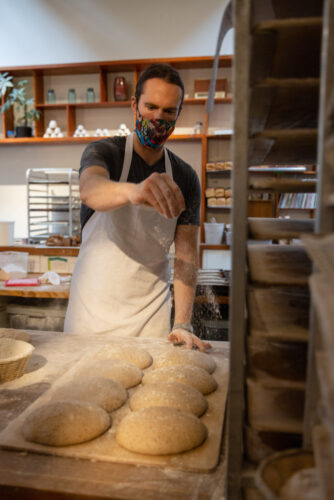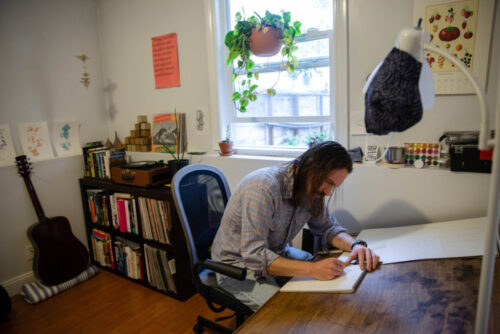Learning to Live in a Pandemic
By John Shaver
The Beginning
The cafe filled up earlier in the morning than usual that first week. Young San Francisco workers sat shoulder to shoulder, their MacBooks spanning the communal tables. Oat milk lattes and avocado toasts soften any seriousness regarding the recent work-from-home order.
“You’re really close to me,” complained a customer as I squatted down to fit a few more loaves of bread onto the retail shelf. She seemed put out. I was definitely off-put. We exchanged glares and I got back to work. Over my many years working in the service industry, I’ve learned not to get too wound up by entitled customers, but this young woman’s comment at the onset of a global pandemic was hard to ignore.
No one seemed to care much for working from home during those critical weeks in early March. In hindsight, I wasn’t exactly the model citizen either. I didn’t think twice about keeping on with my side hustle as a private chef. Technically, I was working from home, it just wasn’t my home. Besides, my clients asked for more meals that week. They, too, were stuck working from home.
Nobody really knew what was going on.
So, just days after grumbling about anxious customers flooding my day job, I began to carefully lay out a bounty of ingredients onto my client’s soapstone countertop. As I unpacked my knives, strained voices whirred through the glass French doors that framed the perfectly manicured side yard. The couple I cook for spilled into the kitchen and hastily informed me that Mayor London Breed had just issued a citywide shelter in place order effective at midnight. They ran out the door to stock up on essentials. I finished preparing their food, packed up my equipment, and headed over to my girlfriend’s place to figure out my next steps.
A novel coronavirus that has to this day infected nearly 40 million people around the world, killing over 1 million of us, was finally being taken seriously by a political leader in this country. With just 112 confirmed cases and little to no consensus regarding the threat of the virus, San Francisco was the first city in the country to announce a lockdown.
We were standing at the brink. The uncertainties began to pour in. Is it safe to go back to work at the bakery? Am I going to get sick? Will I die? Can I get someone else sick? Will they die? Determining my next steps was an acute practice in risk assessment, but the lack of knowledge regarding the infection rate and lethality of COVID-19 was overwhelming. To cope, accurate information about the virus became my lifeblood. Aside from ensuring I had plenty of food and water, my next steps were emphatically unclear.

The Past
When the world catapults towards you, the chaos of the present moment begins to crystalize. I am familiar with the sudden uncertainties that life guarantees. Two years ago, my mother suffered an unexpected seizure that left her in a coma. Early on, the doctors offered a diagnosis that held space for recovery. Her body was healthy, but the condition of her brain was unknown and what would be left of her mind was equally unclear. As the days progressed, it became obvious that the initial diagnosis was too optimistic, and my siblings and I needed to make a decision. Fortunately, we understood my mother and each other, and were able to come to the most loving consensus.
It was best to let go and commit to end-of-life care at a hospice facility. My siblings and I could never know with certainty if my mother would wake up. We made the best decision we could with the information we had. The month or so from when my mom got sick to her passing was filled with the spectrum of human emotion. The outside world fell away, work obligations were skirted, and the present moment grew. The small rituals of the long, slow days were anchors to the passing of time. Napping in the ottoman next to my dying mother each afternoon was everything. The important things in my life rose to the center. Love and family were it.
Before the pandemic, I was stuck navigating my life towards an ideal — reevaluating the trajectory of my career, organizing my life to optimize happiness, seeking to extract meaning through exciting future endeavors, and dreaming about some critical move that would someday bring me true happiness. Life was an exercise in looking outwards for fulfillment and acceptance. I was also adept at examining my past, looking to identify patterns that I felt no longer served me. I dwelled on missed opportunities, regretted missteps, and ruminated about who I was and who I wanted to become. Do I need to figure out a better work situation? Is this the right role for me? Am I living up to my potential? Should I have taken a different path? I was obsessed with cultivating a meaningful life and lost trying to make sense of myself and the world.
About a week into quarantine, I concluded that it was relatively safe for me to continue working at the bakery. A mere two weeks later, a remarkable sense of gratitude began to wash over me. I was still receiving a regular paycheck, I got to leave the house, and I had a community outside of my home to process all the madness.
The blossoming solidarity and support at the bakery were inspirational. I was deeply moved and my default thinking slowed to a halt. Dreaming up a better work situation would have been absurd. Wasting time thinking about how to better position myself for success in the world felt depraved. Prioritizing gratification and attempting to suck the marrow out of every life experience didn’t make sense anymore.
Maybe the recent experience of losing my mother has primed me for life under quarantine. When I left my client’s kitchen to figure out my next steps just a few hours before lockdown, I didn’t have any less information about the future than any other day on this planet. What I had less of were my illusions of accurately being able to predict an outcome. Under less harsh conditions, doubts about the future can often be paralyzing. But these days, doubts are the currency of our time, and like many, I have found myself going all in.
The Present
The arc of one’s life is, if anything, uncertain, and the palpability of the pandemic forces a daily confrontation with that truth. My eyes are opening to see what was always there in front of me. Living with just a little bit less has given me more. There is less attraction to an ideal. My attention is shifting away from my plans, my aspirations… myself. I am left with the process, my process, to amend and tilt towards any practice I choose. I am finally all here in the present.
The limitations imposed by the pandemic taught me a crucial lesson: I’m okay. More profoundly, I’m okay with being okay. My agency in this world is being challenged. The agency I am left with is a pure privilege: The privilege to dig in at my job, to enjoy home-cooked meals, to take more time to read, make art, and once and for all, the privilege to stop worrying about the future. This is the nature of the virus. It shines its spotlight on you and everything in your life.

We are no longer arranging the lights. Our shadows will not stay put. We are forced to look where we once cast shades. The entire social system is illuminated. Tears between us all are now gaping wide.
Vast economic inequality and systemic racism are on vivid display. Environmental catastrophes are ravaging our communities. The future of our country and our planet is far from certain. But, the thing is, our passage has never been secure. The pandemic is revealing what has always been true: the future is a misplaced motivator for human behavior. Just as my endless musings about the outcome of my life have been proven to be unproductive, humanity’s incentive to secure a livable future cannot fully rest on the threat of annihilation. It is too abstract an idea and the concept just doesn’t carry enough weight, even as it is crushing us.
The forests are burning now. Sea levels are rising now. Violent oppression is destroying lives now. A virus is infecting the world’s population now. We must react not to the threat of a terrifying future but to the reality of a terrifying present, a terrifying now.
The preservation of some idyllic future only exists in my mind and the experience living under this pandemic has taught me to let this illusion fade. We are not being called to act now to secure a livable future, we are being called to act now to live now.


Wonderful insightful view into an inspired life. Thank you John.